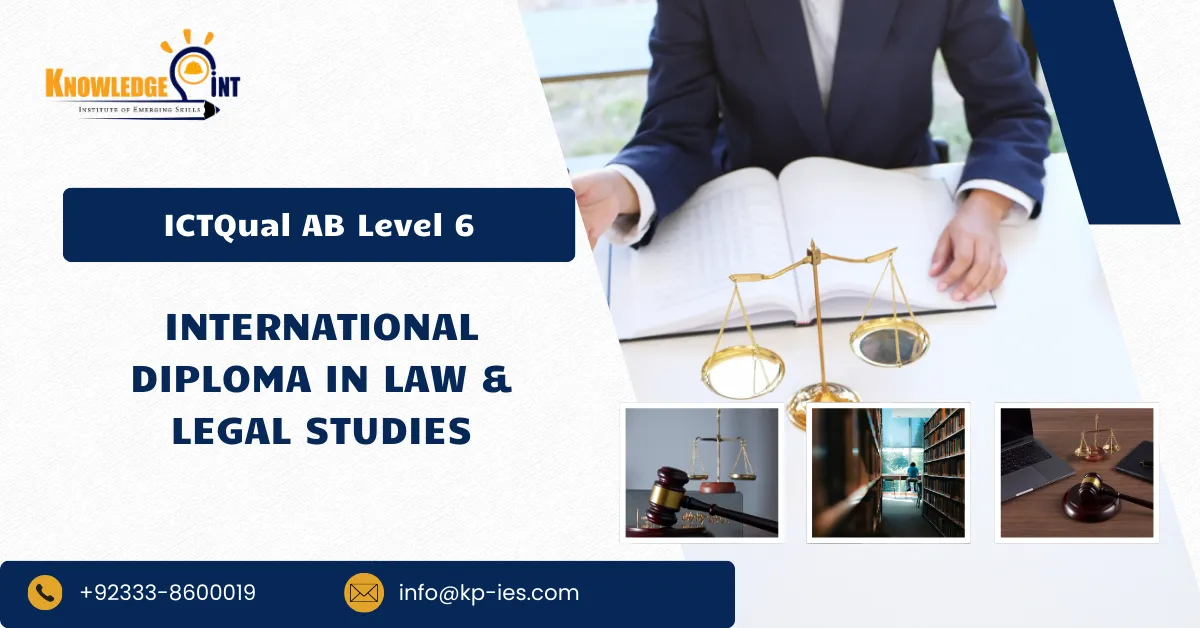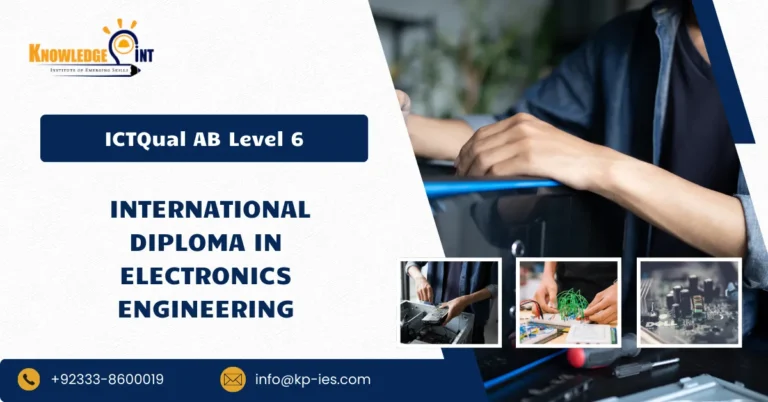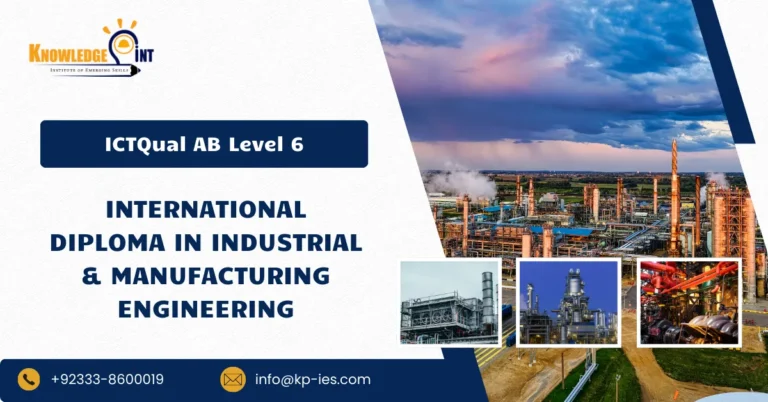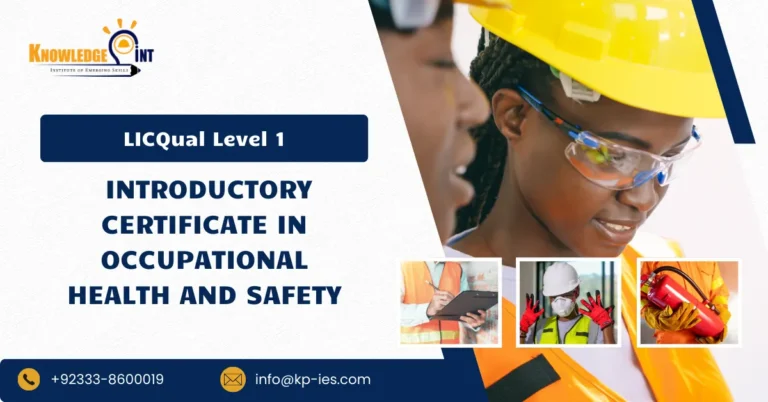The ICTQual AB Level 6 International Diploma in Law & Legal Studies is a comprehensive three-year programme designed to equip learners with in-depth knowledge of law, justice, and governance. With a total of 360 credits, this diploma offers a solid foundation in legal principles while also developing the critical, analytical, and practical skills required in today’s complex legal environment.
Throughout the programme, learners engage with core areas such as constitutional law, criminal law, civil law, contract law, human rights, and international legal systems. The curriculum also integrates research methods, ethics, and legal communication, ensuring that learners gain a well-rounded perspective that prepares them for both local and global legal challenges.
This qualification is ideal for individuals who wish to pursue a career in law, legal administration, public policy, compliance, or related sectors. It is equally valuable for professionals already working in legal or regulatory roles who wish to formalise their knowledge, enhance their expertise, and progress into more advanced responsibilities.
By completing this diploma, learners develop the ability to interpret legal frameworks, apply laws to real-world contexts, and critically assess policies and regulations. They also acquire transferable skills such as problem-solving, negotiation, leadership, and effective communication—qualities that are highly valued across legal and governance professions.
Course Overview
This qualification, the ICTQual AB Level 6 International Diploma in Law & Legal Studies, consists of 36 mandatory units.
Year 1 – Foundation in Political Science & International Relations
- Introduction to Political Science
- Foundations of International Relations
- Comparative Politics and Government Systems
- Political Ideologies and Theories
- History of Political Thought
- Principles of Public Administration
- Introduction to International Organisations
- Global History and World Politics
- Political Communication and Media Studies
- Research Methods in Political Science
- Human Rights and Social Justice
- Introduction to Diplomacy and Foreign Policy
Year 2 – Intermediate Political Science & International Relations
- Advanced Political Theory and Analysis
- International Law and Global Governance
- Political Economy and Development Studies
- Regional Studies: Europe, Asia, Africa, and the Middle East
- Conflict Resolution and Peace Studies
- Political Sociology and Social Movements
- Policy-Making and Public Policy Analysis
- International Political Economy
- Comparative Foreign Policy
- Security Studies and Global Challenges
- Research Methods and Data Analysis in Politics
- Ethics and Professional Practice in Political Science
Year 3 – Advanced Political Science & International Relations
- Contemporary Issues in International Relations
- Strategic Studies and National Security
- International Diplomacy and Negotiation
- Policy Analysis and Political Reform
- Globalisation and Transnational Politics
- Leadership and Governance in Political Institutions
- International Conflict and Crisis Management
- Political Risk Analysis and Strategic Decision-Making
- Environmental Politics and Global Sustainability
- International Cooperation and Development Projects
- Innovation and Emerging Trends in Global Politics
- Capstone Project in Political Science & International Relations
Learning Outcomes for the ICTQual AB Level 6 International Diploma in Law & Legal Studies:
Year 1 – Foundation in Political Science & International Relations
Introduction to Political Science
- Understand the scope, nature, and significance of political science.
- Identify key political concepts, principles, and processes.
- Recognise the role of governance and institutions in shaping society.
- Apply introductory political knowledge to global contexts.
Foundations of International Relations
- Explain the basic theories of international relations.
- Understand the role of states, non-state actors, and global organisations.
- Analyse factors that influence global cooperation and conflict.
- Develop awareness of historical and contemporary IR debates.
Comparative Politics and Government Systems
- Compare political systems and governance models across nations.
- Evaluate the strengths and weaknesses of different political structures.
- Understand electoral systems and institutional frameworks.
- Interpret comparative case studies to assess political outcomes.
Political Ideologies and Theories
- Identify key political ideologies such as liberalism, socialism, and conservatism.
- Analyse the impact of ideologies on governance and policies.
- Distinguish between classical and modern political theories.
- Apply ideological frameworks to current political issues.
History of Political Thought
- Trace the evolution of political thought from ancient to modern times.
- Evaluate the contributions of major political philosophers.
- Understand the historical context shaping political theories.
- Assess the relevance of classical ideas in contemporary politics.
Principles of Public Administration
- Understand the foundations of public administration.
- Analyse the role of government institutions in policy implementation.
- Apply management principles to public sector organisations.
- Evaluate the challenges of transparency and accountability.
Introduction to International Organisations
- Identify the structure and purpose of global organisations.
- Explain the role of the UN, WTO, IMF, and other bodies.
- Assess their impact on global governance and diplomacy.
- Analyse limitations and challenges faced by international organisations.
Global History and World Politics
- Understand key historical events shaping world politics.
- Analyse global transformations, wars, and revolutions.
- Connect historical contexts with current international issues.
- Evaluate the role of colonialism, independence, and globalisation.
Political Communication and Media Studies
- Understand the relationship between politics and media.
- Analyse the role of communication in shaping public opinion.
- Evaluate the impact of social media on political participation.
- Develop skills in interpreting political discourse.
Research Methods in Political Science
- Apply qualitative and quantitative research methods.
- Design and conduct basic political science research.
- Analyse data and present findings effectively.
- Understand ethical considerations in research.
Human Rights and Social Justice
- Understand the foundations of human rights principles.
- Analyse human rights frameworks at global and regional levels.
- Evaluate issues related to justice, equality, and discrimination.
- Assess mechanisms for human rights protection.
Introduction to Diplomacy and Foreign Policy
- Define the principles of diplomacy and foreign policy.
- Understand diplomatic practices and negotiation strategies.
- Analyse the role of foreign policy in state relations.
- Evaluate case studies of diplomatic interactions.
Year 2 – Intermediate Political Science & International Relations
Advanced Political Theory and Analysis
- Critically evaluate modern political theories.
- Apply theoretical frameworks to complex political issues.
- Analyse debates on power, authority, and legitimacy.
- Compare perspectives from different political schools of thought.
International Law and Global Governance
- Understand the principles of international law.
- Evaluate treaties, conventions, and global legal frameworks.
- Analyse the role of international courts and tribunals.
- Assess the challenges of global governance.
Political Economy and Development Studies
- Analyse the relationship between politics and economics.
- Understand theories of development and underdevelopment.
- Evaluate economic policies shaping national progress.
- Assess the role of global institutions in economic governance.
Regional Studies: Europe, Asia, Africa, and the Middle East
- Examine political systems within different regions.
- Understand cultural, historical, and socio-political dynamics.
- Compare regional integration models like EU, AU, ASEAN.
- Assess regional conflicts and cooperation initiatives.
Conflict Resolution and Peace Studies
- Understand theories of conflict and peace.
- Apply negotiation and mediation strategies.
- Evaluate peacebuilding and reconciliation approaches.
- Analyse global case studies of conflict resolution.
Political Sociology and Social Movements
- Analyse the link between politics, society, and culture.
- Understand the role of social movements in shaping policies.
- Evaluate civil society’s role in governance.
- Assess the impact of political participation and activism.
Policy-Making and Public Policy Analysis
- Understand the stages of policy formulation and evaluation.
- Analyse case studies of national and international policies.
- Apply analytical frameworks for assessing policies.
- Evaluate the impact of policies on social development.
International Political Economy
- Analyse trade, finance, and global markets.
- Understand power dynamics in international economic relations.
- Assess the role of multinational corporations in politics.
- Evaluate policies influencing global economic governance.
Comparative Foreign Policy
- Analyse foreign policy decisions across nations.
- Understand the domestic and external influences on policy.
- Evaluate strategies of major global powers.
- Compare foreign policy case studies for practical insights.
Security Studies and Global Challenges
- Understand the concept of security in international relations.
- Analyse threats such as terrorism, cybercrime, and climate change.
- Evaluate national and international security strategies.
- Assess global responses to emerging security challenges.
Research Methods and Data Analysis in Politics
- Apply advanced research design and methodologies.
- Use data analysis tools to interpret political information.
- Conduct field research and surveys effectively.
- Present findings in structured academic formats.
Ethics and Professional Practice in Political Science
- Understand ethical principles in political practice.
- Evaluate dilemmas in governance and public policy.
- Apply ethical decision-making in professional settings.
- Promote integrity and accountability in political careers.
Year 3 – Advanced Political Science & International Relations
Contemporary Issues in International Relations
- Analyse modern global issues such as migration, pandemics, and energy crises.
- Evaluate the impact of these issues on international cooperation.
- Assess state and non-state actor responses.
- Connect theoretical knowledge with practical global challenges.
Strategic Studies and National Security
- Understand defence strategies and security frameworks.
- Analyse military doctrines and strategic policies.
- Evaluate national security policies of different states.
- Assess the role of intelligence in decision-making.
International Diplomacy and Negotiation
- Apply advanced diplomatic strategies in practice.
- Analyse high-level negotiation case studies.
- Understand the influence of soft power in diplomacy.
- Develop practical skills in conflict negotiation.
Policy Analysis and Political Reform
- Evaluate frameworks for analysing public policies.
- Assess the impact of reforms on governance.
- Compare reform strategies in different nations.
- Apply policy analysis tools to real-world cases.
Globalisation and Transnational Politics
- Understand the impact of globalisation on states.
- Analyse the role of transnational actors.
- Evaluate the effects of global interconnectedness.
- Assess both positive and negative consequences of globalisation.
Leadership and Governance in Political Institutions
- Understand principles of political leadership.
- Analyse governance systems and their effectiveness.
- Evaluate challenges in leadership at global and local levels.
- Apply leadership theories to political contexts.
International Conflict and Crisis Management
- Understand crisis management principles in international politics.
- Evaluate strategies for preventing and resolving conflicts.
- Analyse global case studies of crisis interventions.
- Assess the role of international organisations in conflict resolution.
Political Risk Analysis and Strategic Decision-Making
- Apply risk analysis to political and economic contexts.
- Understand decision-making frameworks under uncertainty.
- Evaluate risks in international investment and diplomacy.
- Develop strategies for mitigating political risks.
Environmental Politics and Global Sustainability
- Analyse global environmental challenges.
- Evaluate policies for sustainable development.
- Understand international environmental agreements.
- Assess the role of politics in addressing climate change.
International Cooperation and Development Projects
- Understand frameworks for international cooperation.
- Analyse case studies of development projects.
- Evaluate the role of aid, NGOs, and multilateral initiatives.
- Develop project proposals addressing global development issues.
Innovation and Emerging Trends in Global Politics
- Explore technological and political innovations.
- Assess the impact of digital politics and AI on governance.
- Understand global trends in political participation.
- Evaluate the future of international relations.
Capstone Project in Political Science & International Relations
- Integrate knowledge gained across all years of study.
- Design and conduct a major research project.
- Apply critical analysis and problem-solving skills.
- Present findings in a professional and academic format.
Course Benefits of ICTQual AB Level 6 International Diploma in Law & Legal Studies
- Gain comprehensive knowledge of legal systems, jurisprudence, and constitutional law.
- Develop critical thinking and analytical skills for interpreting laws, cases, and legal frameworks.
- Understand the principles of criminal law, civil law, contract law, and international law.
- Acquire practical skills in legal research, drafting, and case analysis.
- Enhance communication, advocacy, and negotiation skills essential for legal practice.
- Learn about human rights, ethics, and professional conduct within the legal field.
- Build the ability to apply law in business, governance, and international relations.
- Prepare for careers in law firms, judiciary services, corporate legal departments, and government agencies.
After completing this course, learners can progress in the following ways:
- Progress to Master’s degrees in Law (LLM), International Law, Human Rights, or Legal Practice.
- Pursue professional legal qualifications such as Bar Training, Solicitor exams, or Chartered Legal Executive certifications.
- Advance into careers as Lawyers, Legal Advisors, Corporate Counsels, or Policy Analysts.
- Work with law firms, courts, multinational corporations, NGOs, and government bodies.
- Specialize in areas such as corporate law, criminal law, intellectual property law, or environmental law.
- Contribute to policy-making, legislative reforms, and international legal frameworks.
- Engage in academia, research, and legal consultancy at both national and international levels.







